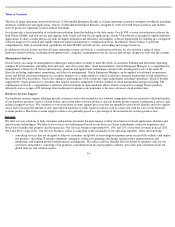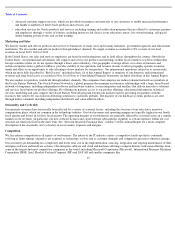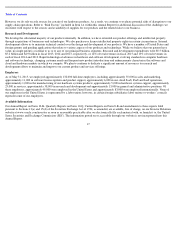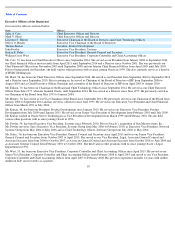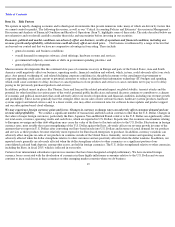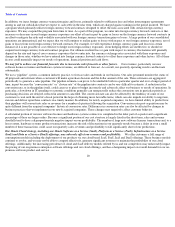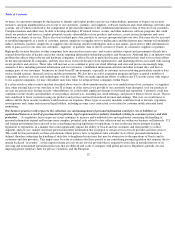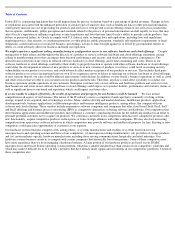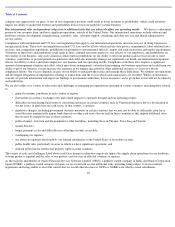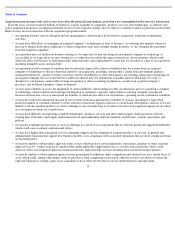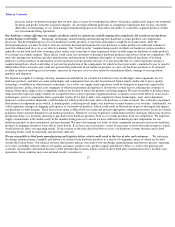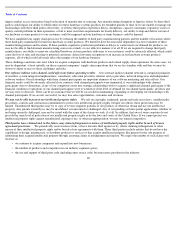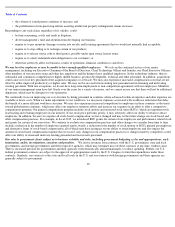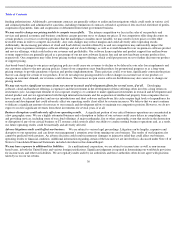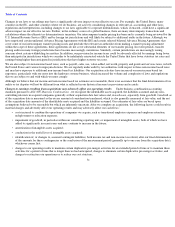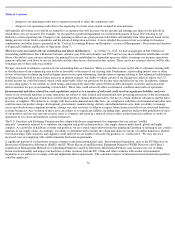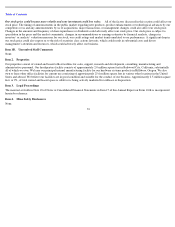Oracle 2014 Annual Report Download - page 27
Download and view the complete annual report
Please find page 27 of the 2014 Oracle annual report below. You can navigate through the pages in the report by either clicking on the pages listed below, or by using the keyword search tool below to find specific information within the annual report.
Table of Contents
Union (EU) is considering legislation that would impose fines for privacy violations based on a percentage of global revenues. Changes in laws
or regulations associated with the enhanced protection of certain types of sensitive data, such as healthcare data or other personal information,
could greatly increase our cost of providing our products and services or even prevent us from offering certain of our services in jurisdictions
that we operate. Additionally, public perception and standards related to the privacy of personal information can shift rapidly, in ways that may
affect Oracle’s reputation or influence regulators to enact regulations and laws that may limit Oracle’s ability to provide certain products. Any
failure, or perceived failure, by Oracle to comply with U.S. federal, state, or foreign laws and regulations, including laws and regulations
regulating privacy, data security, or consumer protection, or other policies, public perception, standards, self-regulatory requirements or legal
obligations, could result in lost or restricted business, proceedings, actions or fines brought against us or levied by governmental entities or
others, or could adversely affect our business and harm our reputation.
We might experience significant coding, manufacturing or configuration errors in our software, hardware and cloud offerings. Despite
testing prior to their release and throughout the lifecycle of a product or service, software, hardware and cloud offerings sometimes contain
coding or manufacturing errors that can impact their function, performance and security, and result in other negative consequences. The
detection and correction of any errors in released software, hardware or cloud offerings can be time consuming and costly. Errors in our
software, hardware or cloud offerings could affect their ability to properly function or operate with other software, hardware or cloud offerings,
could delay the development or release of new products or services or new versions of products or services, could result in creating security
vulnerabilities in our products or services, and could adversely affect market acceptance of our products or services. This includes third party
software products or services incorporated into our own. If we experience errors or delays in releasing our software, hardware or cloud offerings
or new versions thereof, our sales could be affected and revenues could decline. In addition, we run Oracle’
s business operations as well as cloud
and other services that we offer to our customers on our products and networks. Therefore, any flaws could affect our ability to conduct our
business operations and the operations of our customers. Enterprise customers rely on our software and hardware products and services to run
their businesses and errors in our software, hardware or cloud offerings could expose us to product liability, performance and warranty claims as
well as significant harm to our brand and reputation, which could impact our future sales.
If we are unable to compete effectively, the results of operations and prospects for our business could be harmed.
We face intense
competition in all aspects of our business. The nature of the IT industry creates a competitive landscape that is constantly evolving as firms
emerge, expand or are acquired, and as technology evolves. Many vendors develop and market databases, middleware products, application
development tools, business applications, collaboration products and business intelligence products, among others, that compete with our
software and cloud offerings. These vendors include on-premises software companies and companies that offer cloud based SaaS, PaaS, IaaS
and DaaS offerings and business process outsourcing (BPO) as competitive alternatives to buying software and hardware. Our competitors that
offer business applications and middleware products may influence a customer’s purchasing decision for the underlying database in an effort to
persuade potential customers not to acquire our products. We could lose customers if our competitors introduce new competitive products, add
new functionality, acquire competitive products, reduce prices or form strategic alliances with other companies. We may also face increasing
competition from open source software initiatives in which competitors may provide software and intellectual property for free. Existing or new
competitors could gain sales opportunities or customers at our expense.
Our hardware systems business competes with, among others, (i) systems manufacturers and resellers of systems based on our own
microprocessors and operating systems and those of our competitors, (ii) microprocessor/chip manufacturers, (iii) providers of storage products
and (iv) certain industry-specific hardware manufacturers including those serving communications, hospitality and retail industries. Our
hardware systems business causes us to compete with certain companies that historically have been partners. Some of these competitors may
have more experience than we do in managing a hardware business. A large portion of our hardware products are based on our SPARC
microprocessor and Oracle Solaris operating system platform, which has a smaller installed base than certain of our competitors’ platforms and
which may make it difficult for us to win new customers that have already made significant investments in our competitors’
platforms. Certain of
these competitors also
23



